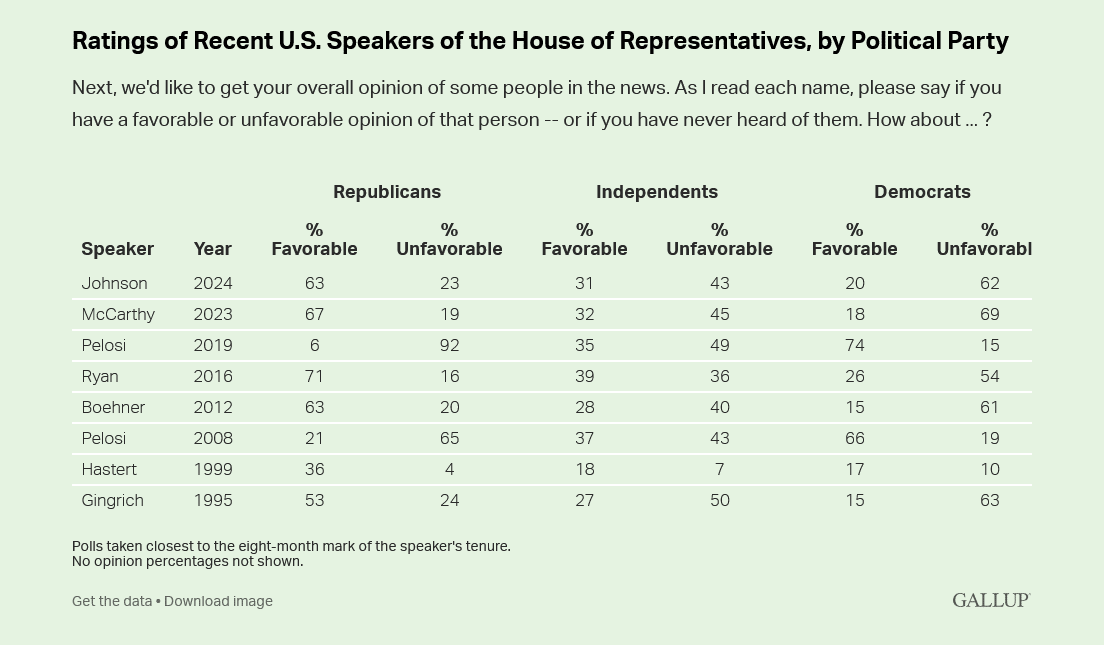Speaker Mike Johnson Viewed Similarly to Kevin McCarthy, Gallup News,
Slightly more hold negative than positive opinions of the current speaker
Americans are more likely to say they have an unfavorable (43%) than favorable (37%) opinion of Speaker of the House Mike Johnson. One in five Americans say they have never heard of him (11%) or are not familiar enough with him to offer an opinion (10%). As would be expected, Johnson’s fellow Republicans tend to rate him positively, while Democrats hold decidedly negative views.

Johnson is currently the highest-ranking Republican in the federal government as the party gathers this week for the Republican National Convention.
The June 3-23 survey marks the first time Gallup has measured favorability of Johnson, who was installed as speaker in October after his predecessor, Kevin McCarthy, was ousted. However, a December Gallup poll measuring job performance found 40% of U.S. adults approving and 56% disapproving of the job Johnson was doing as speaker earlier in his term.
Johnson’s predecessors tended to have higher unfavorable than favorable ratings at roughly similar points in their tenures as speaker. This includes McCarthy, whose 37% favorable and 44% unfavorable ratings in a poll taken last year are almost identical to Johnson’s current ratings.
Nancy Pelosi in her second term as speaker, as well as John Boehner and Newt Gingrich, were also rated more negatively than positively. Pelosi had equally high favorable and unfavorable ratings roughly two years into her first term as speaker. Paul Ryan and Dennis Hastert had higher favorable ratings than unfavorable ratings after eight months, though Hastert was still largely unknown at the time.

Johnson’s ratings from the three major party groups are also near carbon copies of McCarthy’s. In 2023, 67% of Republicans, 32% of independents and 18% of Democrats had positive opinions of McCarthy. Former Republican Speaker Boehner’s party ratings were also similar to those of McCarthy and Johnson. Ryan had better ratings among all party groups than those three Republicans, while Gingrich’s ratings were somewhat worse.
Republicans rated Pelosi better in her first term as speaker than in her second, while Democrats did the opposite.

Although Gallup did not measure opinions of Johnson early in his speakership, new speakers have typically been rated more positively than negatively. This may reflect a rally of positive feelings toward the leader’s party, as most new speakers assume the position after their party wins a majority in the prior year’s congressional elections.
However, as evidenced by the negative ratings speakers receive at roughly the eight-month mark, speakers’ images tend to sour quickly during their tenure. And they don’t usually recover. Speakers Ryan,Boehner, Pelosi, Hastert and Gingrich were all rated more negatively than positively by the end of their tenures.
Bottom Line
Johnson became speaker after an unusually drawn-out process, lasting over three weeks, that saw four different Republican candidates nominated to replace McCarthy. Nevertheless, Johnson’s ratings are similar to those of several recent Republican speakers, suggesting that Americans’ view of these leaders may have more to do with the position and routine partisan reactions to whomever holds it rather than the individual speaker’s personal qualities or performance. Johnson’s net-negative image is also typical of all speakers and could be expected to get even worse if he holds the job for an extended period.
Johnson’s future as speaker will largely be determined by the outcome of this fall’s House elections. Democrats need a net pickup of five seats to reclaim the majority and install their own speaker, likely House Minority Leader Hakeem Jeffries. Johnson has said he intends to continue as speaker past the elections if Republicans hold the majority. But some in his caucus may emerge to challenge him, and his support among Republicans is far from ironclad as he already survived a vote led by a small group of GOP members to oust him as speaker in May.
